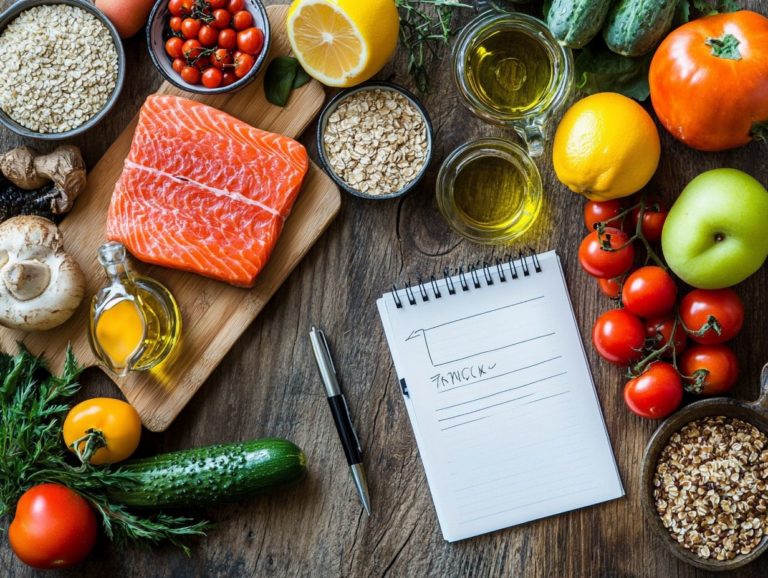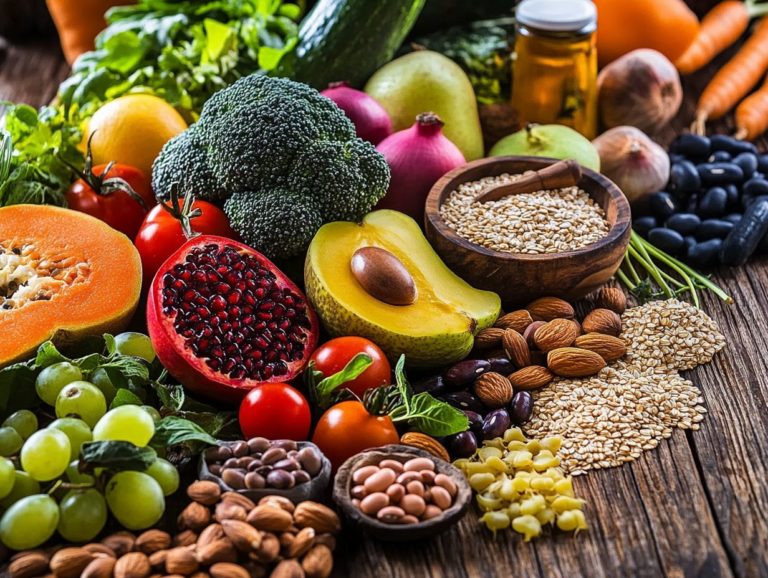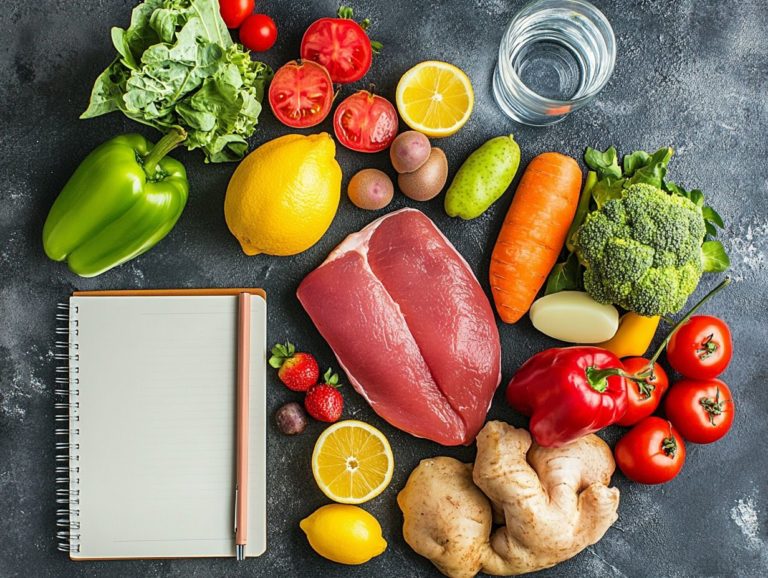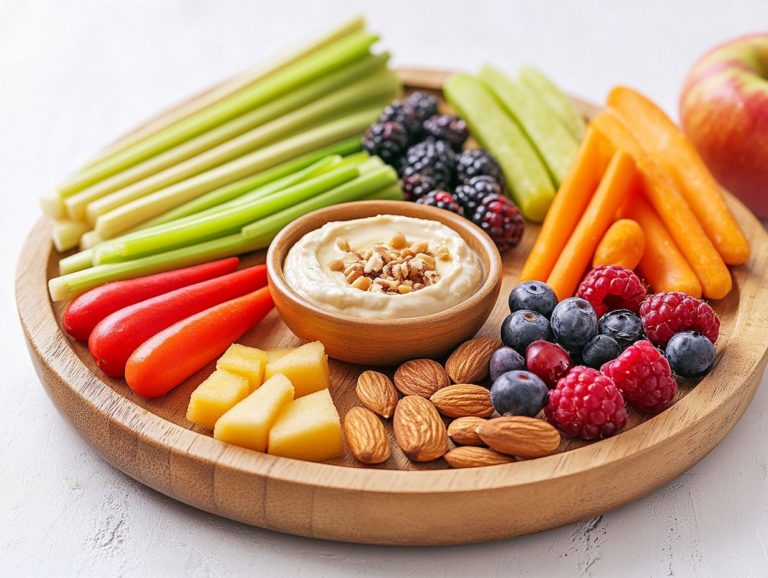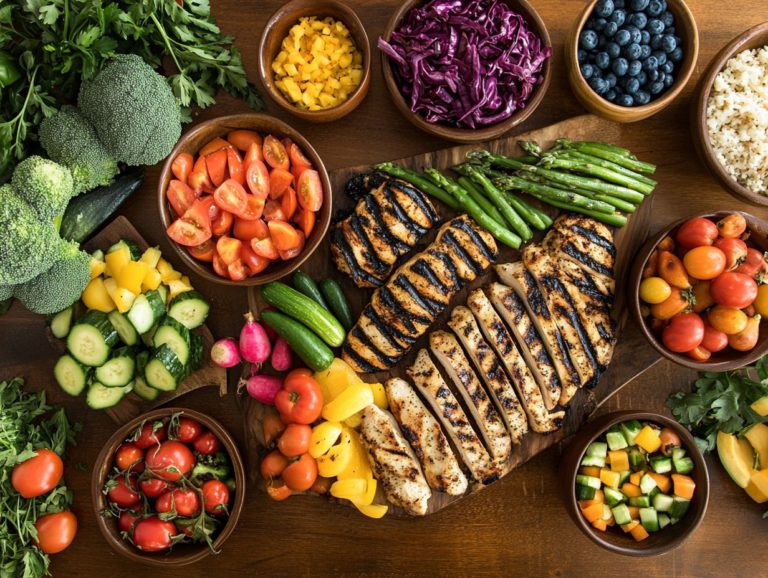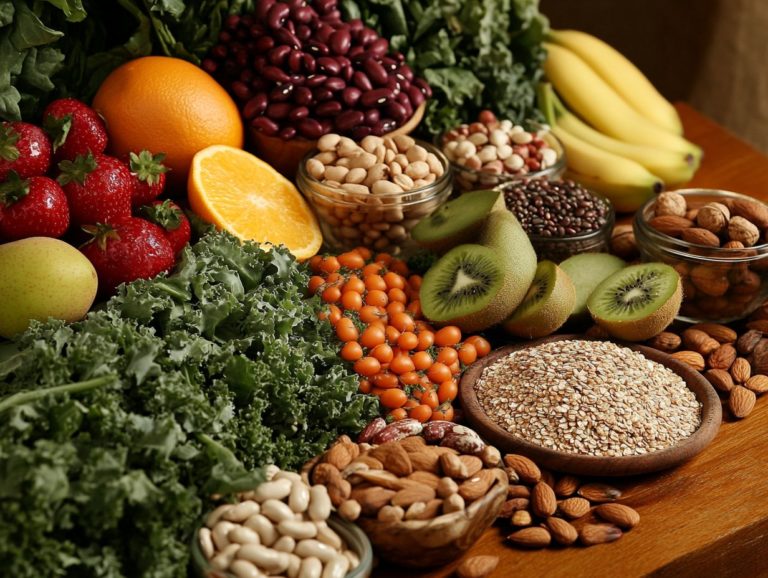Top 5 Balanced Vegan Meals for Every Day
Are you eager to elevate your meals with delightful plant-based options? This article introduces five balanced vegan dishes that are not only nourishing but also brimming with flavor.
From a vibrant Vegan Buddha Bowl to a hearty Lentil and Vegetable Stew, there’s truly something to tantalize every palate.
Explore the benefits of a balanced vegan diet, uncover common nutrient deficiencies, and discover tips for enhancing flavor while promoting sustainability.
Get ready to elevate your meals with these simple yet satisfying recipes!
Contents
- Key Takeaways:
- 1. Vegan Buddha Bowl
- 2. Quinoa and Black Bean Salad
- 3. Lentil and Vegetable Stew
- 4. Tofu Stir-Fry with Vegetables
- 5. Chickpea and Vegetable Curry
- What Are the Benefits of a Balanced Vegan Diet?
- Frequently Asked Questions
- What does a balanced vegan meal consist of?
- Why is it important to have balanced vegan meals every day?
- What are the top 5 balanced vegan meals for every day?
- How can I ensure I am getting enough protein in a vegan meal?
- Can I still get all my essential nutrients on a vegan diet?
- Are there any quick and easy options for balanced vegan meals?
Key Takeaways:
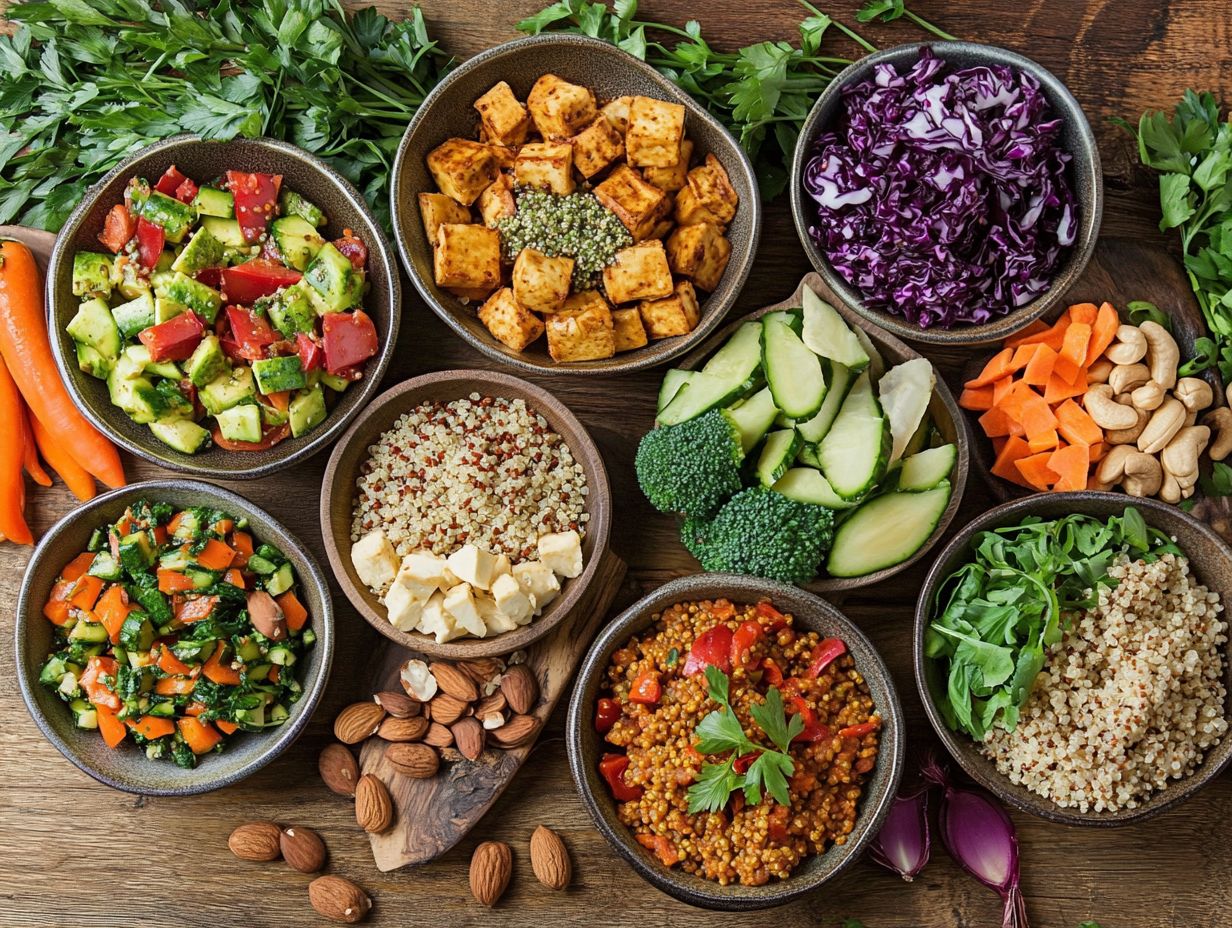
A balanced vegan diet can provide numerous health benefits, including increased nutrient intake and weight loss. Incorporating a variety of grains, legumes, and vegetables into meals can ensure adequate nutrient intake on a vegan diet.
Common nutrient deficiencies in a vegan diet include iron, calcium, and vitamin B12, but these can be easily addressed with proper meal planning and supplementation.
1. Vegan Buddha Bowl
The Vegan Buddha Bowl is your ticket to a vibrant, nourishing meal that highlights the incredible versatility of a vegan diet. It s a delightful fusion of colorful vegetables, healthy fats, and plant-based proteins, resulting in a dish that is both nutritionally balanced and utterly satisfying perfect for anyone embracing a vegan lifestyle.
To create your ideal Buddha Bowl, focus on colorful vegetables like roasted sweet potatoes, crisp kale, and vibrant bell peppers. Each of these brings unique flavors and essential nutrients to the table.
Whole grains, such as quinoa, serve as a hearty base, offering both fiber and a satisfying texture. Healthy fats, like creamy avocado slices or a drizzle of olive oil, enhance the richness and deliver numerous health benefits.
If you re in the mood to personalize your meal, experiment with different plant-based proteins like chickpeas or tofu, taking your dish to the next level. Simple dressings with tahini or lemon juice can unite all the components, making each bite a delightful experience.
This customizable approach allows your Buddha Bowl to cater to various tastes and dietary needs, ensuring it remains a beloved favorite for everyone.
2. Quinoa and Black Bean Salad
Quinoa and Black Bean Salad is a stellar addition to your vegan meal plan. This dish showcases protein-packed quinoa and black beans alongside a vibrant array of colorful vegetables, delivering essential nutrients and delightful flavor.
This dish also provides a hearty helping of protein, brimming with fiber and antioxidants, which are key players in maintaining your overall health. The combination of quinoa and black beans together provides all the essential amino acids your body needs, making it an ideal choice for anyone embracing a plant-based diet.
To elevate both the texture and nutritional profile, toss in diced bell peppers, corn, and freshly chopped cilantro. For a zesty finish, a drizzle of light lime vinaigrette or a tahini-based dressing can add an extra layer of flavor and nutrients without overshadowing the dish.
Incorporating this salad into your regular meals can help you meet your dietary needs, ensuring a well-rounded and satisfying vegan lifestyle.
3. Lentil and Vegetable Stew
Lentil and Vegetable Stew is a hearty, comforting dish that beautifully showcases the healthy benefits of a vegan diet. Enjoy a mix of lentils and fresh vegetables, all packed with essential vitamins and minerals to help you avoid nutritional deficiencies.
Lentils are a protein powerhouse, offering around 18 grams per cooked cup. They also boast a hearty dose of iron, crucial for maintaining your energy levels and overall health. When combined with vibrant vegetables like carrots, spinach, and bell peppers, the stew becomes even more nutritious, adding extra fiber and antioxidants to your meal.
To enhance the flavor, season it with aromatic herbs such as thyme and rosemary, or add a hint of cumin for a warm, earthy undertone. A drizzle of olive oil or a sprinkle of fresh parsley as a finishing touch can transform this everyday dish into a delightful dining experience, making each bowl a celebration of flavor and wellness.
4. Tofu Stir-Fry with Vegetables
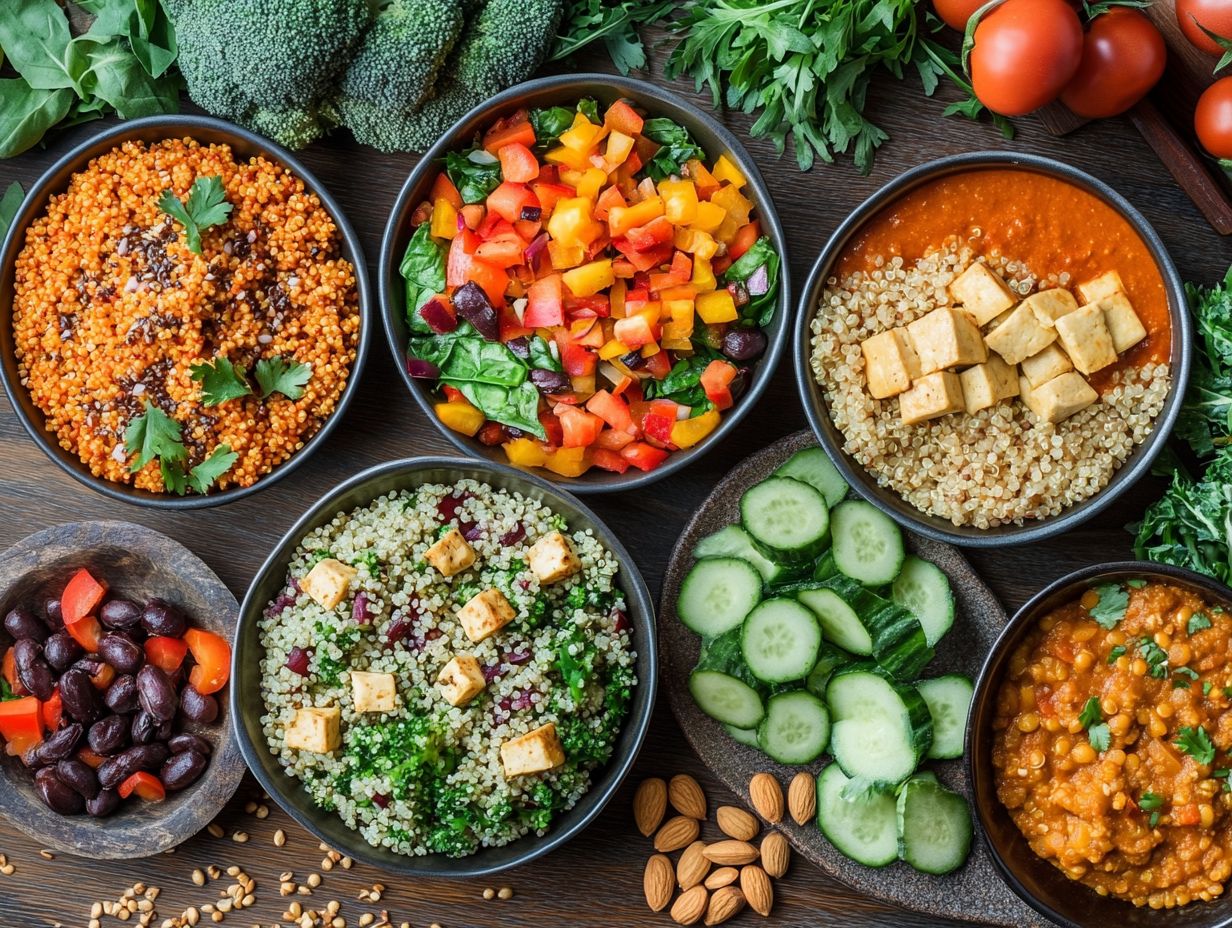
Tofu Stir-Fry with Vegetables is a quick and easy vegan meal. It showcases the versatility of tofu while celebrating a colorful mix of vegetables.
This dish demonstrates how tofu fits into many flavors. Get creative with textures and colors crunchy bell peppers, vibrant broccoli, and tender snap peas come together beautifully.
Stir-frying over high heat keeps each ingredient fresh. It also allows sauces like soy sauce, sesame oil, and ginger to soak in, making it more than just a meal it’s a celebration of delicious plant-based flavors!
5. Chickpea and Vegetable Curry
Chickpea and Vegetable Curry is a delightful celebration of the richness of a vegan diet. Imagine protein-packed chickpeas covered in a tasty sauce with a medley of colorful vegetables.
This dish serves as a hearty meal and shows the amazing nutritional benefits of its key ingredients. Chickpeas are an exceptional source of plant protein and provide a generous amount of dietary fiber, promoting digestive health.
The spices in curry, like cumin, coriander, and turmeric, elevate the flavor and aroma. They also provide anti-inflammatory benefits for a warm and inviting profile.
To enhance your dish, think about adding garam masala for a deeper flavor or fresh herbs like cilantro for a zesty finish. This versatility ensures it appeals to a wide range of palates, making it a true culinary gem!
What Are the Benefits of a Balanced Vegan Diet?
A balanced vegan diet offers many health benefits, including improved heart health and effective weight management. You can reduce your risk of chronic diseases by committing to nutrient-rich plant-based foods.
Incorporating a variety of whole grains, fruits, vegetables, legumes, and nuts helps you enjoy lower cholesterol levels and better digestion. This is thanks to the high fiber content of these foods.
Meal planning is essential on this journey. It enables you to secure all necessary nutrients while catering to your preferences and lifestyle.
For anyone following a vegan diet, sourcing vitamin B12 from fortified foods or supplements is crucial. By being mindful of your dietary choices, you can embrace the extensive health benefits of a well-structured vegan lifestyle.
How Can One Ensure They Are Getting Enough Nutrients on a Vegan Diet?
Ensuring you get enough nutrients on a vegan diet requires strategic meal planning and nutrition knowledge. Sometimes, it may involve supplements and fortified foods to cover essential vitamins and minerals.
Vitamin B12 is vital for nerve function and blood cell production. You can easily include fortified plant-based milks or cereals in your meals and consider supplementation to meet your daily needs.
Iron is another crucial mineral found in lentils and chickpeas. To boost absorption, pair these with vitamin C-rich foods like bell peppers or citrus fruits.
For heart health, omega-3 fatty acids are important. You can find these in flaxseed, chia seeds, and walnuts. However, you might need to consider a direct supplement derived from algae to meet your recommended intake.
By staying mindful of these nutrients and exploring a variety of vegan foods, you can maintain a well-rounded and healthful diet.
What Are the Common Nutrient Deficiencies in a Vegan Diet?
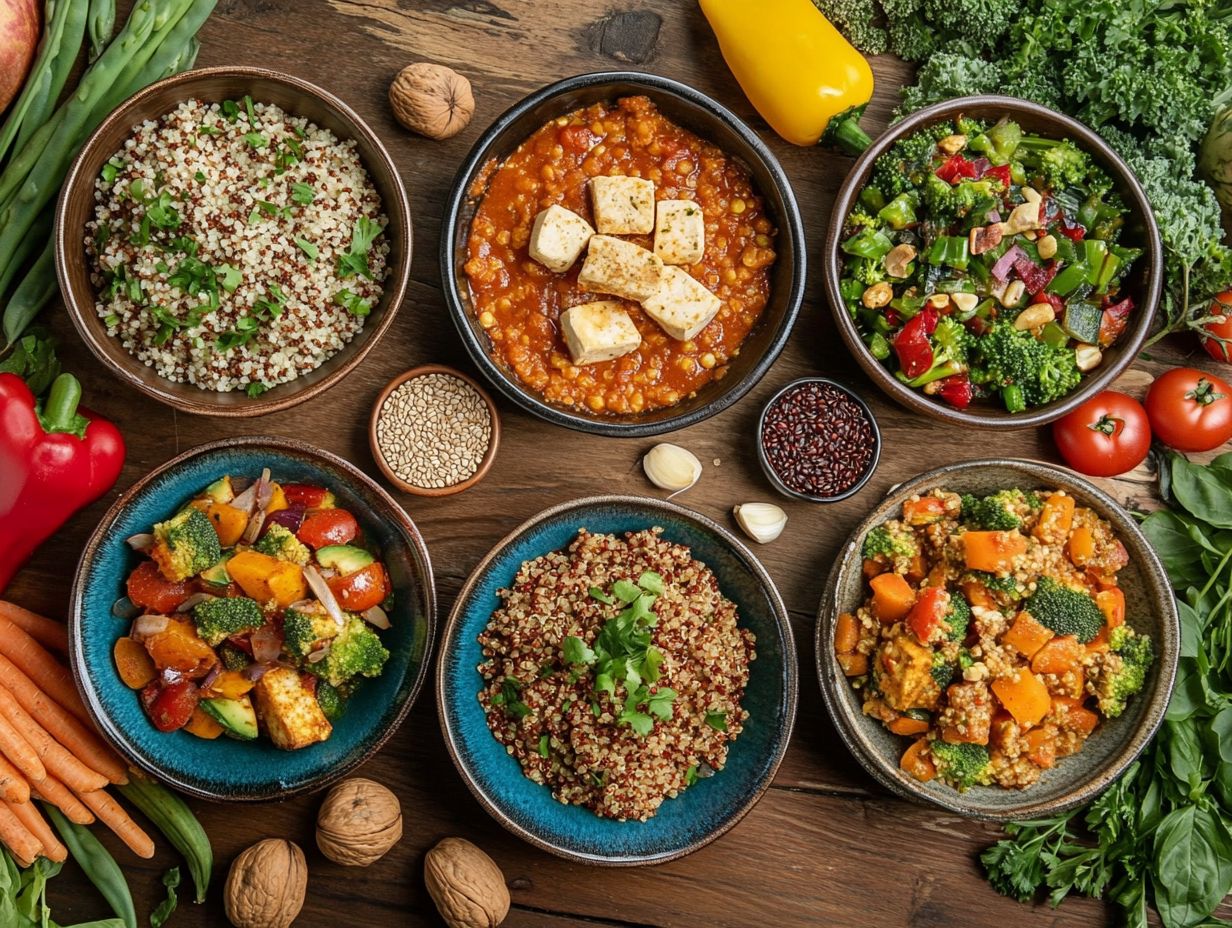
Common nutrient deficiencies in a vegan diet often include vitamin B12, iron, and certain proteins. These issues arise from the exclusion of animal products and highlight the necessity of careful meal planning to navigate potential pitfalls.
If you don t address these deficiencies promptly, you could face a range of health challenges. Insufficient vitamin B12 might leave you feeling fatigued and weak, and can even lead to neurological problems. Similarly, low iron levels can result in anemia, manifesting as dizziness and pale skin.
Don’t ignore proteins! They are key for strong muscles and energy. To counteract these deficiencies, incorporate fortified foods and supplements into your routine.
Vegan sources such as:
- Nutritional yeast is a great source of B12.
- Lentils and chickpeas are rich in iron.
- Quinoa and hemp seeds provide complete proteins.
can significantly contribute to your optimal health. Regular health check-ups are crucial to ensure your nutrient levels are on point; early detection can save you from serious health issues!
How Can One Make Vegan Meals More Flavorful and Interesting?
You can easily make vegan meals more flavorful and intriguing by generously using spices, herbs, and various cooking techniques. Not only do these enhance the taste, but they also preserve the nutritional value of your plant-based ingredients.
To truly elevate the flavor profile of your dishes, selecting the right spices and herbs is crucial. Think about incorporating aromatic options like smoked paprika, cumin, and fresh basil to add depth to any meal.
Don t shy away from experimenting with cooking methods such as grilling, roasting, and marinating. These techniques can significantly enhance the texture and taste of vegetables and legumes.
For instance, marinating tofu in a blend of soy sauce and ginger before grilling creates a smoky, rich dish that s hard to resist.
Roasting vegetables is another game-changer; it caramelizes their natural sugars, transforming them into hearty, delightful complements to any meal.
What Are Some Tips for Meal Planning on a Vegan Diet?
Effective meal planning on a vegan diet is crucial for ensuring that your meals are balanced and meet your nutritional needs. It demands thoughtful selection of ingredients, including a variety of whole grains, legumes, and vegetables, to craft delicious and satisfying dishes.
Incorporating strategies like preparing a weekly menu can streamline your shopping and cooking efforts, making it easier for you to stay on track. Batch cooking is another time-saver that allows you to whip up quick meals throughout the week whenever you need them.
Plus, getting creative with leftovers not only prevents food waste but also adds excitement to your daily meals.
For anyone embracing a plant-based lifestyle, diversifying your ingredients is essential. This approach enhances flavors and ensures you get a well-rounded nutrient intake, helping to avoid the monotony that can come from sticking to a limited selection.
Can a Vegan Diet Be Sustainable for the Long-Term?
Adopting a vegan diet can be a sustainable long-term choice, provided you commit to educating yourself about nutrition, diversifying your meal plans with a wide array of foods, and understanding the health benefits that come with a balanced plant-based lifestyle.
It s crucial to recognize the ethical implications of choosing a plant-forward diet. This lifestyle promotes animal welfare and actively reduces cruelty. The environmental advantages are equally significant; a vegan diet demands fewer resources and results in lower greenhouse gas emissions compared to traditional meat-heavy meals.
Transitioning to this way of eating may come with challenges, such as cravings or difficulties in finding convenient options. To keep your motivation high, consider:
- Setting achievable goals
- Joining supportive communities
- Exploring new recipes that celebrate the delights of plant-based eating
This approach will help ensure your journey remains enjoyable and fulfilling.
Frequently Asked Questions
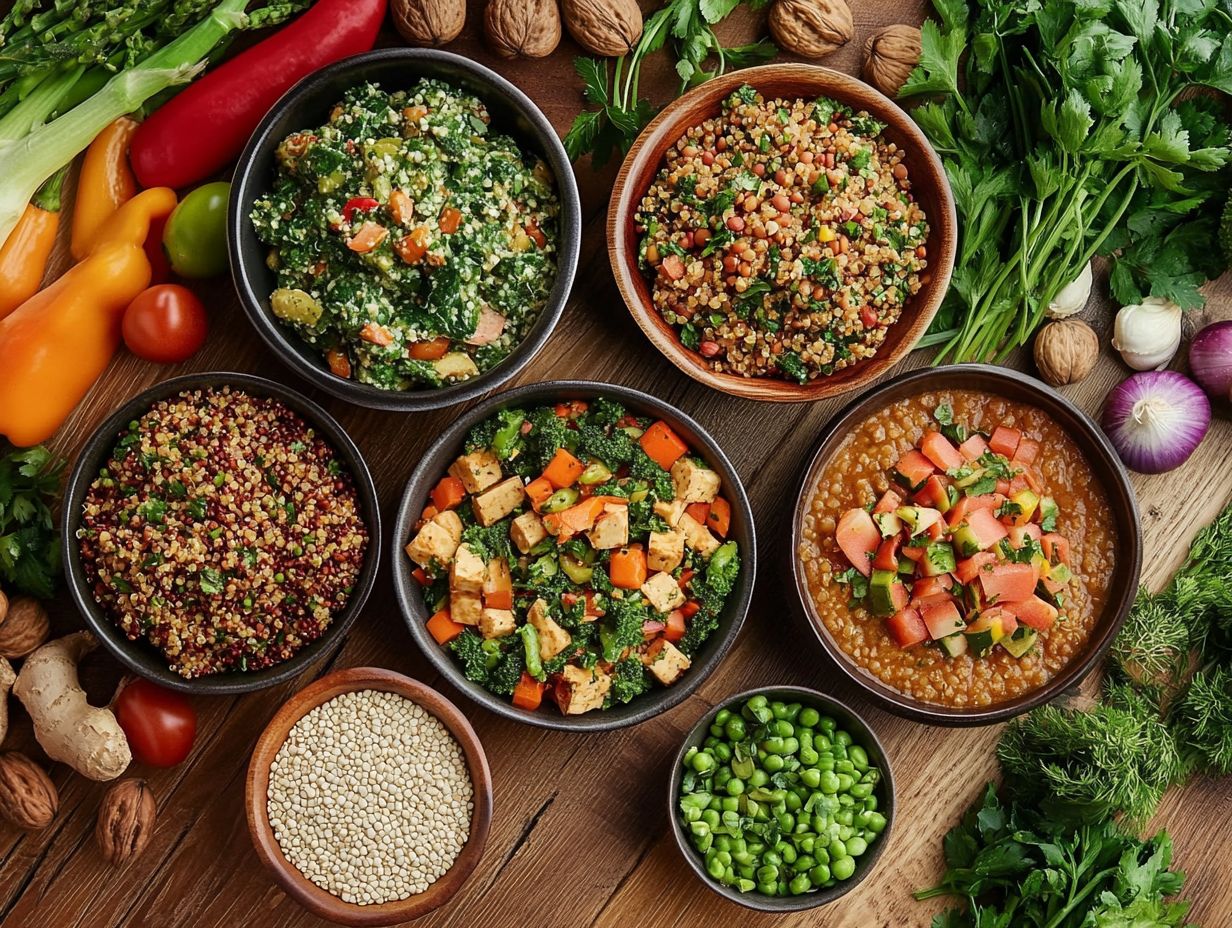
What does a balanced vegan meal consist of?
A balanced vegan meal includes a variety of plant-based foods. Think whole grains, legumes, vegetables, fruits, and healthy fats to get all your nutrients.
Why is it important to have balanced vegan meals every day?
Balanced vegan meals every day give your body essential nutrients. They help maintain a healthy weight and lower the risk of chronic diseases, while also promoting ethical food choices.
What are the top 5 balanced vegan meals for every day?
Here are five fantastic balanced vegan meals you can enjoy daily: quinoa and black bean bowls, tofu stir-fry with veggies, chickpea curry, lentil soup, and roasted vegetable hummus sandwiches!
How can I ensure I am getting enough protein in a vegan meal?
Include plant-based protein sources like tofu, tempeh, beans, lentils, and quinoa in your meals. Mix different sources to cover all your amino acids!
Can I still get all my essential nutrients on a vegan diet?
Yes! A well-planned vegan diet offers all the nutrients you need. Just include a wide variety of plant foods whole grains, legumes, fruits, vegetables, and healthy fats.
Are there any quick and easy options for balanced vegan meals?
Absolutely! Quick vegan meals include overnight oats, salads, veggie wraps, and smoothie bowls. Meal prepping with cooked grains and beans makes cooking a breeze!

